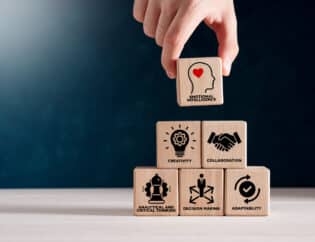Communication skills are key in just about every industry because every industry is made up of companies and every company is made up of people. Communication is the top way people interact with each other to accomplish goals and get work done. If all of the members of a team or a department are good enough communicators, and the teamwork is strong enough, sometimes team members will anticipate what the others need before they even communicate it. Being good at communication is one of those skills where there is always room for improvement; it’s an ongoing process. Here are some tips for better communication skills.
First, visualize what you are attempting to communicate so you can focus on it more completely. If you are distracted, confused about what you are saying, or do not understand the subject matter, it is highly likely whoever you are communicating with will also be confused. Then visualize how you would communicate it effectively if you were actually saying it; kind of a mental dry run. Then visualize the context in which you will be communicating. Is it a Zoom meeting? A conference room? A sports stadium? Visualizing also helps people build up confidence, which is another key ingredient of better communication skills.
Spend a little extra time thinking about your audience. Are there ways you can modify what you are attempting to communicate specifically to your audience? To best answer this question, professional speakers put themselves in their audience’s shoes and ask what they are expecting of the professional speaker. What is their knowledge and experience? What are they trying to learn?
Speaking or writing is only one half of the conversation. The other half is listening to the other person or people while they are communicating. Paying attention to what they are communicating, patiently and actively, not only helps you understand better but it also lets the other person or people know you care about what they are saying. Typically this will motivate them to care about what you have to say too. And assuming you have a decent memory, by properly listening, you will have more substance to respond with when it is your turn to communicate verbally or in writing again. Make sure not to interrupt because you would not want to be interrupted yourself, right? And even though we won’t get into it much here, remember that body language/nonverbal communication is just as important as verbal communication.
First, visualize what you are attempting to communicate so you can focus on it more completely. If you are distracted, confused about what you are saying, or do not understand the subject matter, it is highly likely whoever you are communicating with will also be confused. Then visualize how you would communicate it effectively if you were actually saying it; kind of a mental dry run. Then visualize the context in which you will be communicating. Is it a Zoom meeting? A conference room? A sports stadium? Visualizing also helps people build up confidence, which is another key ingredient of better communication skills.
Spend a little extra time thinking about your audience. Are there ways you can modify what you are attempting to communicate specifically to your audience? To best answer this question, professional speakers put themselves in their audience’s shoes and ask what they are expecting of the professional speaker. What is their knowledge and experience? What are they trying to learn?
Speaking or writing is only one half of the conversation. The other half is listening to the other person or people while they are communicating. Paying attention to what they are communicating, patiently and actively, not only helps you understand better but it also lets the other person or people know you care about what they are saying. Typically this will motivate them to care about what you have to say too. And assuming you have a decent memory, by properly listening, you will have more substance to respond with when it is your turn to communicate verbally or in writing again. Make sure not to interrupt because you would not want to be interrupted yourself, right? And even though we won’t get into it much here, remember that body language/nonverbal communication is just as important as verbal communication.











